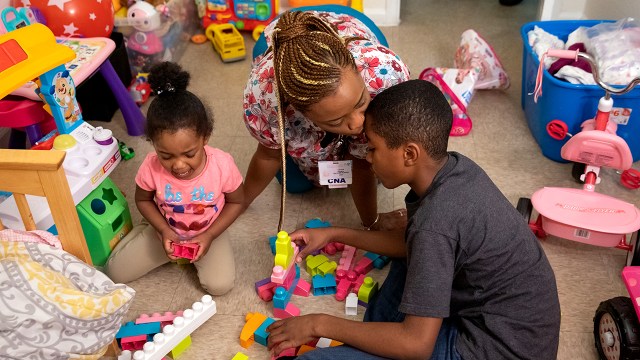
The coronavirus pandemic has created new challenges and reinforced existing ones for many working mothers in the United States. For Mother’s Day, here is a look at American moms’ experiences juggling work and parenting responsibilities during the COVID-19 outbreak, based on data from Pew Research Center surveys.
The data for this analysis was drawn from multiple Pew Research Center surveys, with links included in the text of the post. Most findings are from a Center survey of 10,332 U.S. adults conducted from Oct. 13-19, 2020.
Everyone who took part in the surveys is a member of the Center’s American Trends Panel (ATP), an online survey panel that is recruited through national, random sampling of residential addresses. This allows for nearly all U.S. adults to have a chance of selection. The surveys are weighted to be representative of the U.S. adult population by gender, race, ethnicity, partisan affiliation, education and other categories. Read more about the ATP’s methodology.
In the early months of the pandemic, there was an increase in the share of mothers who said they preferred not to work for pay at all. In an October 2020 survey, about a quarter (27%) of mothers with children younger than 18 at home said that at that point in their life, the best work arrangement for them personally would be not working for pay at all, up from 19% who said so in a summer 2019 survey.
The share of mothers who said working full time would be best for them dropped from 51% to 44% during that span, while around three-in-ten in both surveys said they would prefer to work part-time.
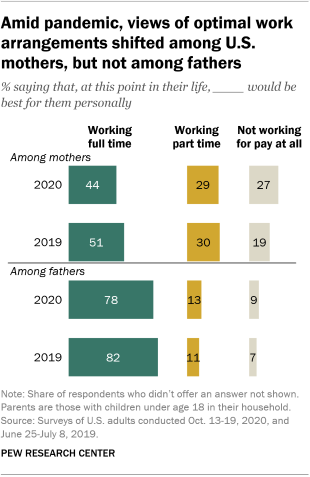
Employed moms were more likely than working dads to report experiencing professional hurdles during the pandemic, according to the same October 2020 survey. Among working parents with children under age 18 at home, mothers were generally more likely than fathers to say that, since the beginning of the coronavirus outbreak, they faced a variety of professional challenges.
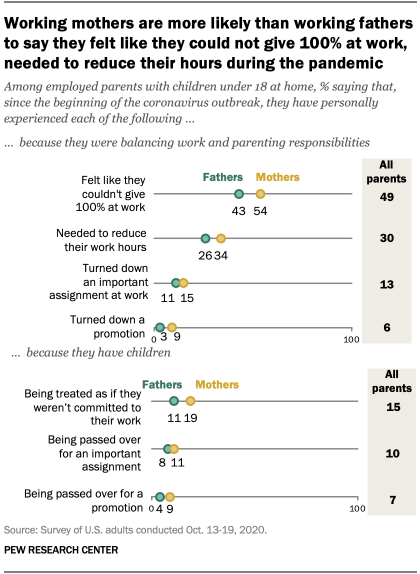
For example, 54% of working moms said they felt like they could not “give 100%” at work because they were balancing work and parenting responsibilities, compared with 43% of working dads who said this. Working moms were also more likely than dads to say they needed to reduce their work hours because of parenting responsibilities (34% vs. 26%) and to report being treated as if they weren’t committed to their work because they have children (19% vs. 11%).
These patterns mirrored those found before the coronavirus outbreak in the summer of 2019 when working parents were asked if these things had ever happened to them.
In general, mothers view themselves as shouldering more child care duties than their spouses or partners do, while dads are more likely to say these responsibilities are evenly shared, according to the October 2020 survey. About three-quarters of moms in opposite-sex relationships (74%) said they did more to manage their children’s schedules and activities than their spouse or partner; only 3% said their spouse or partner took on more of these responsibilities. Roughly half of mothers (54%) said they did more than their spouse or partner to be an involved parent, while just 3% said their spouse or partner did more.
Most fathers in opposite-sex relationships (63%) said being an involved parent was equally shared between them and their spouse or partner; a smaller share of mothers (43%) said the same. Similarly, fathers were more likely than mothers to say that they and their partner or spouse shared the management of their kids’ schedules and activities (36% vs. 23%). These findings also largely reflect patterns from before the pandemic.
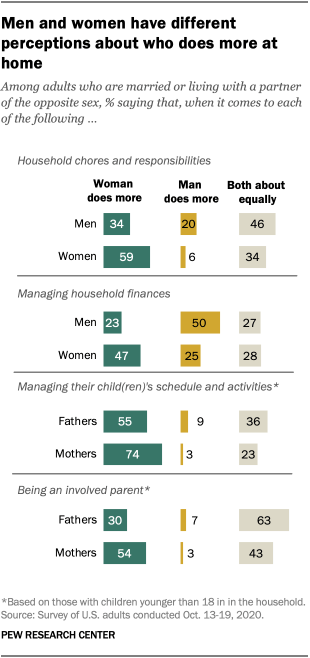
Earlier this year, about half of working parents said the coronavirus outbreak had made it difficult to handle child care responsibilities, and moms were especially likely to report this problem. Around six-in-ten moms (58%) said this had been at least somewhat difficult in recent weeks, compared with 43% of working dads, according to a February 2022 survey of working parents with children younger than 12 at home. These figures were similar to those reported by working moms and dads in October 2020, when many schools and child care centers were not operating in person.
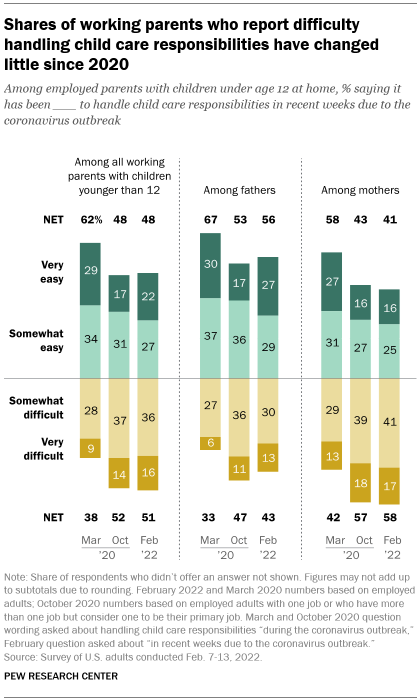
More than a third of moms who teleworked during the early months of the pandemic said they had a lot of child care responsibilities while working from home, according to the October 2020 survey. Among employed parents who were working remotely all or most of the time and had children younger than 18 at home, 36% of moms said they had a lot of child care duties during this time – roughly double the share of dads who said the same (16%). Moms and dads were about equally likely to say they had at least some child care responsibilities while working from home (66% vs. 65%).
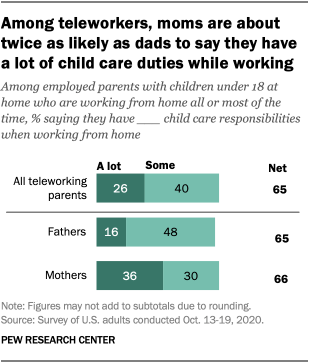
Many moms and dads who worked from home early on in the coronavirus pandemic reported difficulties getting their work done without interruptions, the October 2020 survey found. About half of mothers (52%) and fathers (48%) with children under 18 at home who worked remotely all or most of the time said that since the beginning of the coronavirus outbreak, it had been very or somewhat difficult for them to get their work done without interruptions. A much smaller share of teleworkers without minor children at home (20%) reported the same.
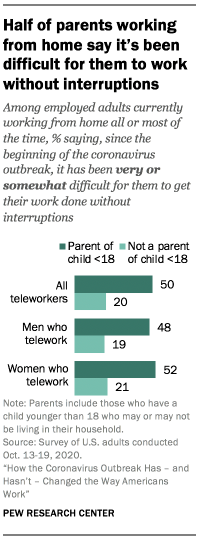
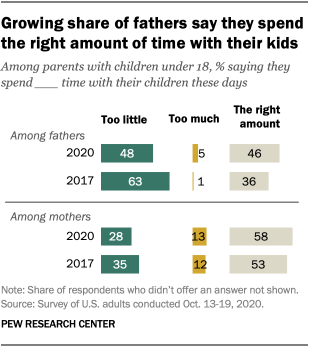
Around six-in-ten moms felt that they spent about the right amount of time with their children in 2020. In an October 2020 survey, 58% of mothers with children under 18 at home said they spent the right amount of time with their children, compared with 28% who said they spent too little time with their kids and 13% who said they spent too much time with them.
Nearly half of fathers (46%) said they spent the right amount of time with their children. A similar share (48%) said they spent too little time with their kids, and only 5% of dads said that they spent too much time with their children.